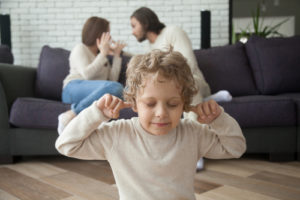New Jersey Children’s Bill of Rights Protects Children of Separation and Divorce
Divorce is an emotional and complicated situation for most couples. If you are a parent, divorce will not only be emotionally difficult and complicated for you, but for your children as well. In New Jersey, the Association of Family and Conciliation Courts have adopted a set of guidelines, which, although not enforceable law, are frequently […]

Divorce is an emotional and complicated situation for most couples. If you are a parent, divorce will not only be emotionally difficult and complicated for you, but for your children as well. In New Jersey, the Association of Family and Conciliation Courts have adopted a set of guidelines, which, although not enforceable law, are frequently incorporated by lawyers and judges into legal agreements and Court Orders. This set of guidelines, commonly known as the New Jersey Children’s Bill of Rights, gives suggestions to keep the best interests of the child(ren) a priority in a separation or divorce. While the emotions associated with separation and divorce certainly make co-parenting more difficult, the New Jersey Children’s Bill of Rights provide concerned parents with useful guidelines for addressing post-separation custody and parenting time issues. These parents should accordingly discuss the New Jersey Children’s Bill of Rights with one another and/or with their attorneys and, in so doing, insist that all the following Rights be both followed and enforced for the benefit of their child(ren):
- Children should never be put in a position where they are asked to take sides between parents. Do not disagree or argue in front of your child, this hurts them, avoid negative communication and disagreements in front of them. Let children be neutral and love both parents equally.
- Children should never be treated as pawns, possessions or negotiating chips. Children are people and should be treated as such. Do not use your child as a weapon. Don’t deprive the other parent time with a child out of revenge against that parent’s actions.
- Children should be able to freely and privately communicate with both parents. Children should be allowed reasonable use of the telephone and be permitted to call and receive calls from the other parent and relatives, such as grandparents. Parents should not interfere with communications from the other parent to the child. Children should be given privacy when they communication with the other parent.
- Children should not be asked questions by one parent about the other. Children should be allowed privacy concerning time with the other parent, and not be pushed into sharing what they did when spending their time with the other parent.
- Children should not be used as a messenger. Children should not be asked to deliver messages to the other parent.
- Children should be permitted to express their feelings. Listen to what your child has to say. Children should know that the separation and/or divorce was not caused by anything the child did or did not do.
- Children should have adequate visitation with their parent of alternative residence to best serve the child’s needs and wishes.
- Children should be able to love and have a relationship with both parents without being made to feel guilty.
- Children should not have to hear either parent say anything bad about the other. Parents should not put one another down while their children are present.
- Children should have the same educational opportunities and economic support that they would receive if their parents did not divorce. Parents should do their best to provide the most adequate level of economic support possible.
- Children’s best interests are paramount. Children should be encouraged to know and come to appreciate what is good in each parent.
- Children should maintain their status as children and not take on adult responsibilities for the sake of the parent’s well-being. Children should not take on the role of therapist or become a sounding board for either parent venting gripes about the other parent, or be put in the position of being a confidant to the exclusion of the other parent.
- Children should be able to request parents seek appropriate emotional and social support when needed. Although it is understandable that parents may find themselves overwhelmed and or emotional, children likewise may be feeling this way. Seeking the help of a qualified therapist for oneself, one’s child or the family unit, may be appropriate.
- Children should be able to expect consistent parenting at a time when little in their lives seem constant or secure. Try your best to keep promises to your child and to have similar rules at both households. Keep the child’s routine as familiar as possible.
- Children should be able to expect healthy relationship modeling. You are the role model your child will use for relationships in the future.
- Children should be able to expect the utmost support when taking the time and steps needed to secure a healthy adjustment to their current situation. Let your child know you are there for them, take care of yourself, and allow friends and family to stay connected and be there to support you and your child through this difficult time. Make sure your child has any special comforting toys or objects with them when spending time with the other parent.
